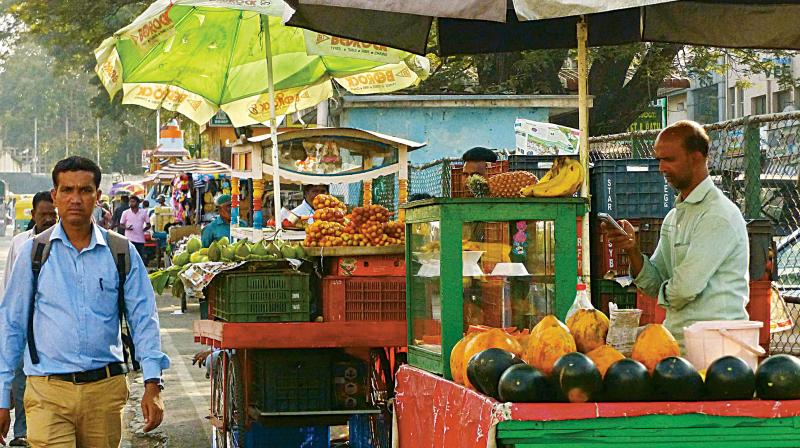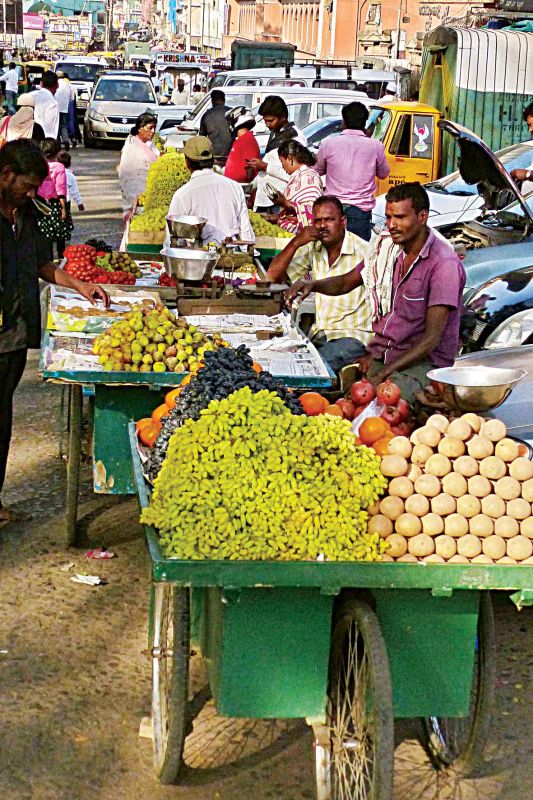Give Bengaluru back its streets, BBMP

Vendors rule the city streets, transforming parks into street food hubs every evening and lining up outside schools and offices in the afternoons., leaving behind mounds of garbage, blocking traffic on busy roads and upsetting local residents. The Street Vending Act of 2014 calls for designated hawker zones as well as IDs and trade licences for vendors - which the BBMP has failed to implement, report Chandrashekar G. and Rohan Ramesh
Come evening and there is a mela around some parks in the city, with vendors turning out in large number to sell everything from momos to dosas and pani puris from their carts stationed around them.
With people flocking to them, they provide a carnival –like ambience for a few hours, but what follows is not so pretty. The morning sees garbage strewn on the roads and pavements, which the pourakaramikas themselves are often reluctant to clear, leaving the area in a mess much to the dismay of local residents, who then tend to go on the warpath against the vendors.
If people in residential areas are wary of the street hawkers, so are schools as the students often make a beeline for them after school hours to enjoy the cut fruits, raw mangoes or pani puri they sell in these parts. While their presence in commercial areas is tolerated a lot more, in the absence of hawking zones , the vendors tend to park their carts at will and block traffic on the roads, creating a nuisance for everyone concerned.
While in some localities residents actively campaign to remove them, parents of school children are quite helpless as they can do little to stop them from enjoying the food the vendors have to offer, however unhygienic it may be.
Says Ms. Veena Srinivasan, whose son studies in the New Horizon Public School, “My son always finishes school and then runs to his favourite pani puri-wallah. I would gladly take him to a safe and trusted establishment for his pani puri, but the truth is he only wants to go out with his friends. So I give him some money every day. But I am scared to death about the potential health hazards of eating street food. Off course I want my son to avoid it. But I have no choice!”
Another concerned mother , Gita, says her class II daughter too loves to eat street food. “I absolutely hate it and have even disciplined her, but she doesn’t listen. The security guards need to be more careful and not allow these street hawkers near the schools,” she adds.
Dr. Manohar K. N, consultant physician, Manipal Hospitals, believes the onus is on the BBMP to regulate the street vendors and make sure they sell hygienic food. “People can come down with typhoid, hepatitis and even cholera if they eat unhygienic food," he warns, underlining that the authorities need to look into this and ensure the hawkers’ food is not contaminated in the interest of the people's health.
Authorities seek clarity on legislation
Although the BBMP has promised to earmark hawking zones in the city on the lines of Kuala Lumpur in Malaysia for the convenience of both vendors and Bengalureans, it has done little about it so far.
Ask BBMP joint commissioner (health), Sarfaraz Khan and he admits that hawkers have been operating without license or identity cards across the city. “The hawkers enjoy the backing of a number of activists and non- governmental organisations and cannot be evicted easily even with police force,” he regrets.
Also explaining that the BBMP has sought some clarifications on the Street Vendors Protection of Livelihood and Regulation of Street Vending Act 2014, he says once the ambiguities are cleared, the vendors will be issued identity cards and their activities monitored.
“ The identity cards will be similar to a trade licence, but they will not be charged or only charged nominally for them,” he adds, assuring that the promised hawking zones too will be created shortly.
But in the meanwhile, he claims, the BBMP has held a series of meetings with members of street hawkers associations to sensitise them to keeping their surroundings clean and tidy.
Making a strong case for a hawking zone in the city, general secretary of the Hawkers Federation, C. E. Rangasway, says under the Street Vendors Protection of Livelihood and Regulation of Street Vending Act, 2014, 2.5 per cent of a city should be earmarked for street vendors and places like Delhi and Rajasthan have already acted on it to protect the interest of the hawkers.
Guest column: BBMP must conduct a survey, issue valid id cards to all street vendors, says Vinay K Sreenivasa, Alternative Law Forum
Street vendors form an integral part of urban economies worldwide, and make living in a city more affordable for the working and middle classes by providing them low cost access to goods and services.
They not only provide jobs to crores across India, but also create indirect jobs in the formal and informal sector. Besides, they make our streets vibrant and safe. But instead of being encouraged, the vendors face several challenges as they carry on with their businesses. A much persecuted lot, they come in for harassment from several authorities and some of the city's residents too while the BBMP remains apathetic to their needs.
Although it has been given enough funds under the Deendayal Antyodaya Yojana - National Urban Livelihood Mission (DAY-NULM) to do a survey of the street vendors, give them ID cards, training, loans and so on, it has hardly made any move on this front. Shamefully, other than the BBMP, all other urban local bodies in Karnataka have issued ID cards to street vendors under this scheme.
In several areas the vendors have themselves filled up the survey forms and requested it to verify their presence and issue them ID cards, but this too has failed to provoke it to act. And while it has set aside Rs 2 crore in its current budget to meet the needs of street vendors, it has not yet decided how to spend the money!
It's clearly time for the BBMP to wake up from its lethargy, and conduct a survey of all street vendors under the DAY-NULM scheme and issue them ID cards. It can then plan how best to protect their rights while also benefiting the local communities around them.
Number of hawkers in city: 2,50,000
Number of wards in city: 198
Average hawkers in each ward: 700
Plans for Hawkers zone: 8


